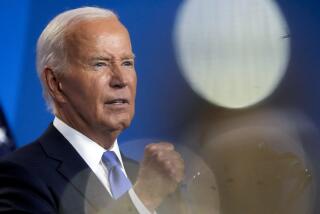Open Primary Proposal
- Share via
Proponents of an open primary cite the victory in the 1992 Republican U.S. Senate primary by Bruce Herschensohn as evidence that the existing closed primary exaggerates the influence of extreme voters (“Rival Parties Unite Against Open Primary,” March 20). This is putting the blame in the wrong place. Herschensohn’s principal opponent, Tom Campbell, did not lose because moderate Democratic and independent voters were unable to vote in the Republican primary--as they could if Prop. 198 were in effect--but because moderate voters were split between Campbell and a third candidate, Sonny Bono.
Outcomes like the 1992 primary could be prevented by switching to either a system in which primary voters rank-order their preferences (the “alternative vote”) or one in which voters vote for as many candidates in their party’s primary as they wish (the “approval vote”). Either system would have allowed Campbell to win the primary without forcing Republicans to open their primary to non-Republican voters, because Bono’s voters would also have cast ballots for Campbell, and not for the more extreme Herschensohn.
MATTHEW SHUGART
La Jolla
* You write, “Ever since California adopted primary elections as the means of nominating candidates in 1908, voters have been allowed to vote only for candidates of the party to which they belong.” This is not quite true. Your article fails to mention the practice called cross-filing, the 1913 authorization to file for nomination for more than one party. For example, by cross-filing, the late Gov. Earl Warren won both the Democrat and Republican nomination for his second term as governor in 1946.
MARGARET MORELL
Buena Park
More to Read
Get the L.A. Times Politics newsletter
Deeply reported insights into legislation, politics and policy from Sacramento, Washington and beyond. In your inbox twice per week.
You may occasionally receive promotional content from the Los Angeles Times.










